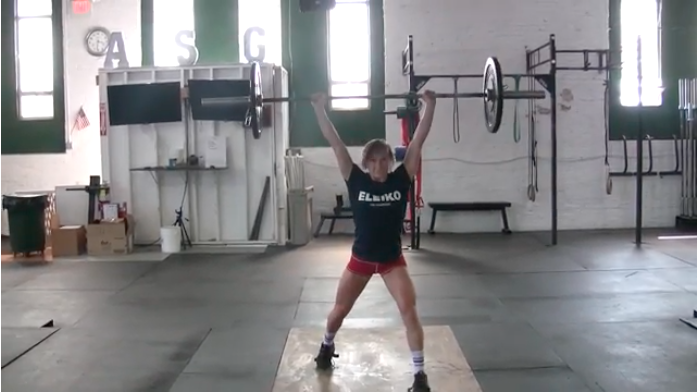By Tim Morris
At a mere 100 pounds, Kaitlin Montague is becoming a heavyweight in the sport of weightlifting.
Relatively new to the sport, the Long Branch High School and Stockton University graduate is one of the up-and-coming competitors in lifting. She was one of just six lifters from New Jersey to qualify for the USA Weightlifting National Championships in Salt Lake City, Utah. She won her most recent competition, the Fairleigh Dickinson Open, June 19, competing in the 48K (105.6-pound weight class).
“I used to despise weightlifting,” Montague said.
She had an extensive athletic background prior to taking up weightlifting. She competed in field hockey, track and field and lacrosse while at Long Branch. She also did dancing and was a gymnast. She played field hockey at Stockton until an ACL injury ended her career.
Still looking for an athletic and competitive outlet, Montague turned to CrossFit. She is a part-time CrossFit coach at Absolute Strength Gym in Long Branch. She’s only part time because this powerhouse is doing graduate work at Rutgers University, where her major is library science. She’ll compete for Rutgers in September in the University Nationals.
CrossFit is where Montague first started to take weightlifting seriously, she noted.
It was at the encouragement of Rob Esposito, the head coach and owner of Absolute Strength Gym, that Montague got started in the sport.
It was a local competition at the Long Branch gym where he talked her into competing and to her surprise, she won.
“I won by a lot,” she said. “Rob set me down and told me if I took it serious, I could be good at it. He believed in me.”
Esposito saw in Montague all the ingredients it takes to succeed in the sport.
“I saw her work ethic in CrossFit,” he said. “[Weightlifting] takes a lot of effort and time.
“The lifts are very technical, and it takes time. It takes a lot of attention to detail, and she is detail oriented.”
A lot of the time Esposito spends with Montague is spent honing that technique, he said.
Esposito also liked something else about the sport: its fairness. The lifters compete by weight class, which means a lifter’s size and weight doesn’t matter. They compete against athletes in their weight class, as in wrestling or boxing.
Olympic-style competitive weightlifting is far more than picking up a barbell and lifting it over your head. It required athleticism, strength and finesse.
Competition in weightlifting is the combined total weight of two different lifts. One is the snatch — from a squat position, the lifter raises the bar over their head with arms outstretched in one motion before standing up — and the other is the clean and jerk, where the lifter moves the barbell from the floor to the chest and then, in one move, lifts the weight above their head with the arms and legs straight.
Montague’s personal bests are 143 pounds in the snatch and 180 for the clean and jerk.
“It’s very challenging,” Montague said, not only of the sport itself but the training that goes into it.
She still does CrossFit as part of her extensive five-day-a-week training program. Cardio is also essential, as well as endurance.
“Muscle endurance is absolutely a part of conditioning,” she said. “I do a lot of volume. You get very tired.”
Running is a part of her cardio training, although it is now shorter sprinters and not 800- and 1,600-meters races on the track as in her Long Branch days.
While all of the sports she participated in before becoming a competitive weightlifter helped her catch on to the sport quickly, they weren’t the only reason she’s been so good.
“I’ve always been very competitive,” she said. “It’s not about the girls next to me; it’s about me against me.”
Montague is also becoming a spokesperson for lifting and its benefits to women.
“It’s one of the safest sports,” she said. “It has done a lot for females. There’s a new focus on strength — both inner and outer.”
Weightlifting has been good for Montague for reasons beyond winning competitions.
“I’m very quiet, not outgoing,” she said. “It’s helped my self-confidence.”

